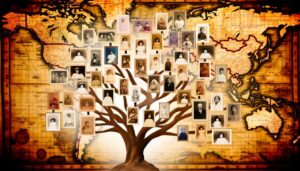Oliver Name Origin and Meaning
The name Oliver originates from the Old Norse name Áleifr, which translates to 'ancestor's descendant'. Its linguistic evolution spans Old French to Middle English, reflecting significant cultural and phonetic shifts.
Prominently featured in medieval literature such as 'The Song of Roland,' Oliver embodies qualities of bravery and fidelity. The name's adaptability is evident in its various global forms, such as Olivier in French and Olav in Scandinavian languages.
Oliver's sustained popularity is underpinned by its historical depth, ease of pronunciation, and positive cultural associations. Exploring its journey through time reveals intriguing insights into its enduring appeal.

Key Takeaways
- Oliver originates from Old Norse as Áleifr, meaning 'ancestor's descendant.'
- The name evolved through Old French and Middle English, showcasing linguistic change.
- Oliver symbolizes bravery and fidelity, as seen in medieval literature like 'The Song of Roland.'
- Global variations include Olivier (French), Oliviero (Italian), and Oliverio (Spanish).
- Oliver remains popular due to its historical depth and contemporary appeal.
Old Norse Roots
The name Oliver finds its origins in Old Norse, where it is derived from the name Áleifr, meaning 'ancestor's descendant.' This etymological root underscores a profound connection to heritage and lineage, reflecting the societal importance placed on ancestry in Norse culture. The name Oliver has continued to hold significance throughout history, with variations of the name being used in various cultures and languages. It is interesting to note how names can carry such deep meanings and connections to the past. In a similar vein, the meaning of the name Andreas stems from Greek origins, derived from the word “aner” meaning ‘man’ or ‘warrior.’ This etymology also highlights the cultural importance placed on the characteristics and qualities represented by a person’s name.
The evolution of Áleifr to Oliver illustrates linguistic change as the name traveled through various cultures, particularly adapting in Old French and Middle English. Such shifts highlight the fluidity of language and the ways in which names can embody historical and cultural changes.
The enduring popularity of the name Oliver across centuries can therefore be attributed to its deep-rooted significance and the adaptability of its phonetic structure, making it a name with both historical depth and contemporary appeal.
Medieval Literature
Medieval literature frequently features the name Oliver, showcasing its integration into the cultural and narrative fabric of the period. One of the most prominent examples is 'The Song of Roland,' an epic poem that highlights Oliver as the loyal companion of the hero Roland. This character portrayal reflects the name's association with qualities such as bravery and fidelity.
Additionally, Oliver appears in various Arthurian romances, further cementing its presence in medieval storytelling. The name's recurrence in these narratives indicates not only its popularity but also its symbolic resonance, representing ideals of chivalry and knighthood.
This widespread use in medieval texts reveals a deep cultural significance, underscoring the name's enduring legacy within the literary traditions of the Middle Ages.
Linguistic Evolution
As the name Oliver permeated medieval literature, its linguistic evolution reveals a fascinating journey through various languages and cultural adaptations.
Originally derived from the Old Norse name Áleifr, meaning 'ancestor's descendant,' Oliver was adopted into Old French as Olivier. This transformation was significantly influenced by the Latin word 'oliva,' meaning olive tree, symbolizing peace and fruitfulness.
As medieval texts, such as the epic poem 'The Song of Roland,' popularized the name, it gradually spread across Western Europe. In England, Oliver gained prominence post-Norman Conquest, integrating into Middle English.
The name's phonetic and orthographic modifications over centuries underscore its enduring appeal and adaptability, reflecting broader linguistic shifts and cultural exchanges in Western history.
Global Variations
Across different cultures and regions, the name Oliver has evolved into various forms, reflecting the unique phonetic and linguistic characteristics of each language.
In French, it transforms into Olivier, emphasizing a softer, more fluid pronunciation.
In Italian, it becomes Oliviero, showcasing the language's characteristic vowel endings.
The Spanish adaptation, Oliverio, similarly adheres to the linguistic tendencies of Spanish phonology.
In Scandinavian countries, the name often appears as Olav or Olaf, reflecting regional phonetic patterns.
Slavic adaptations include the forms Oleg and Olivar, where consonantal shifts are notable.
These global variations underscore the adaptability of the name Oliver, demonstrating how it seamlessly integrates into diverse linguistic systems while retaining its inherent identity.
Modern Popularity
The adaptability of the name Oliver across various languages and cultures is paralleled by its enduring and widespread popularity in contemporary times. Statistically, Oliver has consistently ranked among the top names for boys in numerous countries, including the United States, United Kingdom, Australia, and New Zealand. This sustained popularity can be attributed to its classic appeal, ease of pronunciation, and the positive cultural associations it carries.
In the United States, for instance, the name Oliver has been in the top ten names for boys since 2017, reflecting its broad acceptance. Additionally, the resurgence of traditional names in modern naming trends further cements Oliver's status as a timeless choice, appealing to both historical appreciation and contemporary sensibilities.
Conclusion
The name Oliver, with its Old Norse roots, rich presence in medieval literature, and linguistic evolution, demonstrates a fascinating historical journey.
Global variations have further enriched its cultural significance.
Importantly, Oliver surged to prominence in recent years, ranking as the third most popular name for boys in the United States in 2020, according to the Social Security Administration.
This resurgence underscores the enduring appeal and timeless nature of this historically rich name.






